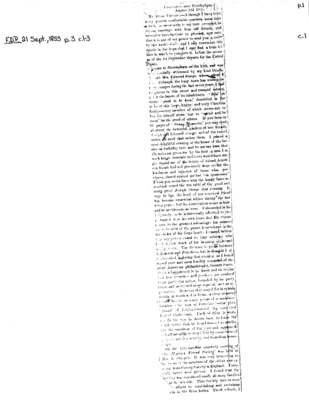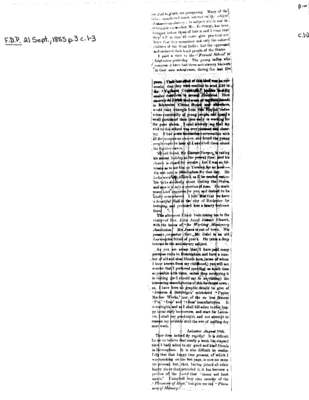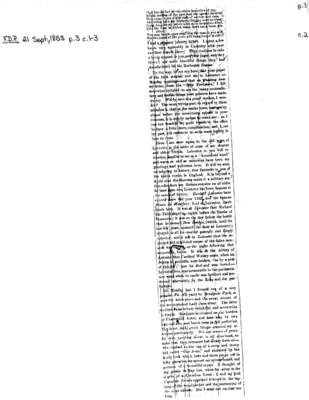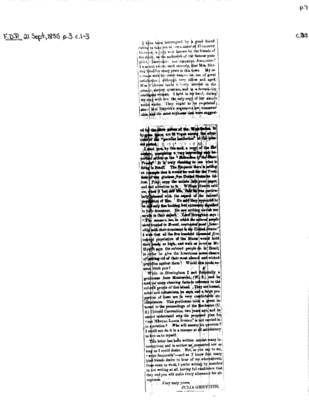Pages
D6854_Page_1
EDGBASTON, near Birmingham, August 23d, 1855.
MY DEAR FRIEND:—Although I have been in my present comfortable quarters more than a week, so incessantly is my time occupied, in joyous meetings with dear old friends, and agreeable introductions to pleasant, new ones, taht it is out of my power to send you a letter by this week's mail; and I conly commence this epistle in the hope that I may find a little leisure in which to complete it, before the steamer of teh 1st September departs for the United States.
I came to Birmingham on the 15th, and was most cordially welcomed by my kind friends, Mr. and Mrs. Edmund Sturge, whose guest I am. Although the busy town has undergone many changes during the last seven years, I find no change in this sweet and tranquil retreat, [illelgible] in the hearts of its inhabitants. "It is" (in truth) "good to be here," domiciled in the midst of this large, happy, and truly Christian family—every member of which seems not to live for himself alone, but to "spend and be spent" for the good of others. If you turn to the pages of "Sunny Memories," you may read all about the beautiful gardens of our friends, Joseph and Edmund Sturge, and of the tunnel under the road that unites them. I passed a most delightful evening at the house of the former on Saturday last; and let me say here, that the welcome given me by the host (a man I so much honor venerate and love) would have amply repaid me of the letters of valued American friends had not previously done so for the harshness and injustice of those who, perchance, sinned against me but "in ignorance." I wish you could have seen the happy faces assembled round the tea table of the good and truly great Joseph Sturge that evening. It may be that the head of our esteemed friend has become somewhat whiter during the last seven years; but his constitution seems as hale and he as vigorous as ever. Unbounded in his hospitality, as he is universally admitted to be, perhaps it is on his own home that Mr. Sturge is seen to the greatest advantage: his countenance brimful of the purest benevolence, is the true index of his large heart: I cannot believe that any person could be long unhappy who [illegible] within reach of his beaming smile—and [illegible] voice. The distance is great between Edgbaston and Peterboro, but in thought I often traveled it during that evening, as I found myself ever and anon forcibly reminded of the great American philanthropist, GERRIT SMITH. What a happiness it is know and to realize that true greatness and goodness are confined to no particular nation, bounded by no party [illegible] and restricted to no especial sect or organization. However they may differ in minute details, in words and in forms, a close observer cannot fail to see many points of resemblance between "the man of Peterboro"—the plain "friend" of Edgbaston—and the [illegible] Earl of Shaftesbury. Each of them is working in the way he deems best; to leave the world better than he found it—and to ameliorate the condition of the poor and oppressed, and all are alike distinguished by earnestness of purpose, untiring activity, and boundless benevolence.
On the 17th inst. the quarterly meeting of "The Negroe's Friend Society" was held at Mrs. E. Sturge's. It was very interesting to me to meet the members of the oldest now existing Anti-Slavery Society in England. Fortyeight ladies were present. I found that the meeting was considered small, as many families [were?] at the sea side. This Society directs most [illegible] efforts to establishing and sustaining schools in the West Indies. These schools, I
D6854_Page_2
am glad to learn are prospering. Many of the ladies manifested much interest on the subject on American slavery; (a subject which our indefatigable co-worked, Mrs. E. Sturge, has been bringing before them of late and I trust that they will, in time to come, give practical evidence that they remember not only the colored children of the West Indies, but the oppressed and enslaved dark hued people of the States.
I paid a visit to the "Friend's School" in Edgbaston yesterday. The young ladies who compose it have had three anti-slavery bazaars, in their own school-room, during the last five years. Their last effort of this kind was so successful that they were enable to send £30 to the "Vigilance Committee," besides making smaller donations in several directions. How sincerely do I wish that some of my [illegible] friends in Rochester Clever Street and elsewhere, would take example from this English industrious community of young people, and spend a small portion of their time daily working for the poor slaves. I need scarcely say that my visit to this school was very pleasant and cheering. I had some interesting conversation with all the inmates on slavery, and found the young people eager to hear all I could tell them about the fugitive slaves.
My old friend, Mr. George Dawson, is taking his annual holidays at the present time, and his church is closed for repairs; but I was so fortunate as to see him on Tuesday, for an hour.— He was only in Birmingham for that day. He looks worn and wearied as if he needed rest.— He talks decidedly about visiting the States, and says it is only a question of time. He made many kind enquiries for you and desire to be kindly remembered. I told him that we have a beautiful Hall in the city of Rochester for lecturing, and promised him a hearty welcome there.
This afternoon I have been taking tea in the vestry of Rev. John Angel James's Church, with the ladies of "the Working Missionary Association." Mrs. James is out of town. His present, co-pastor (Rev. Mr. Dale) is an old Leamington friend of your's. He takes a deep interest in the anti-slavery subject.
As you are aware that I have paid many previous visits to Birmingham, and have a number of old and dear friends here, (some of whom I have known from my childhood,) you will not wonder that I preferred spending as much time as possible with them, rather than occupying it in visiting (or I should say in re-visiting) the interesting manufactories of this far-famed town; so, I have here no graphic details to give of "Jennens & Bettridge's" celebrated "Papier Machee Works," nor of the no less famous "Pin," "Iron" and "Glass" manufactories. It is midnight, and as I shall bid adieu to this happy home early to-morrow, and start for Leicester, I shall say good-night, and not attempt to resume my scribble until the eve of mailing day next week.
Leicester, August 30th.
Time does indeed fly rapidly! It is difficult for me to believe that nearly a week has elapsed since I bade adieu to my good and kind friends in Birmingham. It is also difficult to realize fully that that happy time present, of which I was speaking on the last page, is now no more the present, but, that having joined all other happy time that preceded it, it has become a portion of the PAST that "comes not back again." Campbell may sing sweetly of the "Pleasures of Hope," but give me the "Pleasures of Memory."
D6854_Page_3
"Let fate do her worst—there are relics of joy, Bright dreams of the past, that she cannot destroy, That come in the night time of sorrow and care, And bring back the features that used to wear; Long long be my heart with such memories filled, Like the vase in which roses have once been distilled; You may break—you may ruin the vase if you will, But the scent of the roses will hang round it still." I had a pleasant journey hither. I spent a few hours very agreeable in Coventry with your excellent friends, the—. They continue to take a lively interest in you and your paper, and they showed me some beautiful things they had manufactured for the Rochester Bazaar.
By the way, let me say here that your paper of the 10th August met me in Leicester on Monday morning—and that on glancing over my letter from the "Ship Yorkshire," I felt somewhat irritated to see the many contradictory and foolish things your printers have made me say. Where were the proof readers, I wonder? The most trying part in regard to these mistakes is, that as five weeks must, necessarily, elapse before the corrections appear in your columns, it is utterly useless to make any; so I can but beseech my good friends in the office to have a little more consideration, and I, on my part, will endeavor to write more legibly in time to come.
Here I am, once again, in the old town of Leicester, in the midst of some of my dearest and oldest friends. Leicester is, you will remember, familiar to me as a "household word," and warm as well as numerous have been my greetings and welcomes here. It will be seen, on referring to history, that Leicester is one of the oldest towns in England. It is beyond a doubt that the Romans made it a military sta tion—for here are Roman remains on all sides. In later ages, too, Leicester has been famous in the annals of history. Earls of Leicester have existed since the year 1102, and the famous Simon de Montfort, Earl of Leicester, dwelt much here. It was at Leicester that Richard the Third slept two nights before the Battle of Bosworth; it was on the day before the battle that he crossed Bow Bridge, (which, until the last few years, spanned the Soar at Leicester,) arrayed in all his martial panoply and kingly splendor; and it was to Leicester that the neglected and mutilated corpse of the fallen monarch was carried on the night following that memorable battle. It was to the Abbey of Leicester that Cardinal Wolsey came, when his dreams of ambition were broken, "as by a peal of thunder;" here he died and was buried.— Leicester, too, was memorable in the parliamentary wars, when its castle was fortified and garrisoned alternately, by the King and the parliament.
On Monday last I formed one of a very pleasant Pic Nic party to Bradgate Park, at once the birth-place and the sweet retreat of the accomplished Lady Jane Gray. The drive to these ruins is very delightful, and seven miles in length. Bradgate is situated on the borders of Charnwood forest, and here may be seen oak, and elm, and beech trees in full perfection. The dense, dark green foliage arrested my attention particularly. We saw scores of graceful deer, sporting about in all directions, so tame that they retreated but slowly from us.— We climbed to the top of a steep and mossy hill, called "OLD JOHN," and sheltered by the hard rock which here and there peeps out in lofty pinnacles, we spread our sylvan hoard, and partook of a bountiful repast. I thought of my picnic in May last, when far away in the depths of a Canadian forest, I and my kind Canadian friends together listed to the tapping of the wood-pecker and the murmuring of the sister stream. But I must not ruralize too long.
D6854_Page_4
I have been interrupted by a good friend calling to take me to see a sister of ELIZABETH HEYRICK, a lady well known to the friends of the slave, as the authoress of the famous pamphlet, "IMMEDIATE NOT GRADUAL ABOLITION." I was not aware, until recently, that Mrs. Heyrick lived for many years in this town. My interview with her sister was to me, one of great satisfaction; although very infirm and aged, Miss Coltman, takes a lively interest in the present slavery question, and is a remarkably intelligent woman. I held in my hand, during my stay with her, the only copy of her sister's entire works. They ought to be re-printed; since Mrs. Herick's arguments are unanswerable, and the same sophisms that were suggested by the slave power of the West Indies, in by-gone times, are in vogue among the advocates of the "peculiar institution" at the present period.
I send you, byt this mail, a copy of the Examiner, containing a very interesting and important article on the "Extinction of the Slave Trade." It is truly cheering to see what is doing in Brazil. The Emperor there is setting an example that it would be well for the President of the glorious free United States to follow. Pray copy the article into your paper, and call attention to it. William Hewitt told me, when I last saw him, that he was particularly pleased with the aspect of the colored population of Rio. He said they appeared to be not only fine looking, but extremely dignified in their demeanor. He saw nothing slavish nor servile in their aspect. Lord Brougham says: "The manner, too, in which the colored people were treated in Brazil, contrasted most favorably with their treatment in the United States." I wish that all the five hundred thousand free colored population of the States would hold their heads as high, and walk as erect as Mr. Hewitt says the colored people do in Brazil, in order to give the Americans some chance of getting rid of their most absurd and wicked prejudice against them! would this mode answer, think you?
While in Birmingham I met frequently a gentleman from Montserrat, (W. L.) and he told me many cheering facts in reference to the colored people of that island. They are honest, sober and industrious, he says, and a large proportion of them are in very comfortable circumstances. This gentleman took a great interest in the proceedings of the Rochester (U. S.) Colored Convention, two years ago, and he cannot understand why the proposed plan for"THE MANUAL LABOR SCHOOL" is not carried into operation? Who will answer this question? I could not do it in a manner at all satisfactory to him or to myself.
This letter has been written amidst many interruptions, and is neither as connected nor as long as I could desire. But, as you say to me, "write frequently"—and as I know that many kind friends desire to hear of my whereabouts, from week to week, I prefer writing by snatches to not writing at all, having full confidence that they and you will make every allowance for abruptness.
Very truly yours,
JULIA GRIFFITHS.



